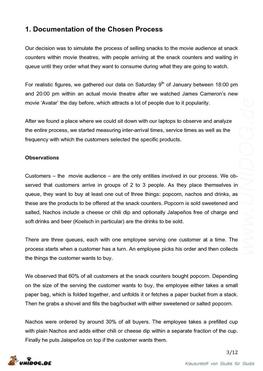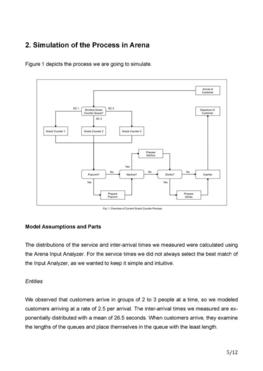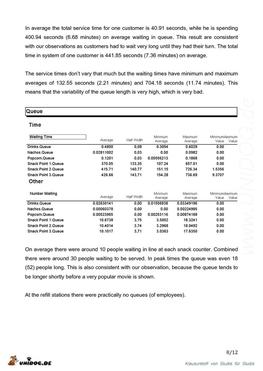| Dokumente | |
|
|
Dokumentvorschau |
Supply Chain Planning - Simulation Project (SCM II) |
Dokument-Nr.: F-ABF6 |


|
|
Dokument-DownloadUm Zugriff auf dieses Dokument zu erhalten, musst Du Mitglied der UNIDOG Community sein. |
|
Inhalt / Beschreibung
Das Simulation Project war Bestandteil der eigenständig zu bearbeitenden Aufgaben in der Veranstaltung "Supply Chain Planning". Meine Gruppe hat sich für die Optimierung der Warteschlangen an Kino Snack-Countern entschieden. Erzielte Punkte: 5/5
Titel des Projekts Simulation Project: Movie Theatre Snack Counters
Executive Summary On the 8th of January, a Friday evening, we went to a large movie theatre in the inner city of Cologne to see James Cameron’s new masterpiece ‘Avatar’. While standing in the queue of the snack counters, we realized that the process of selling snacks to the movie audience could be significantly improved. Waiting times in queue as well as service times were very long – so we decided to come back the next day and model and optimize the process. The data on which the simulation is based was gathered on the 9th of January between 18:00 and 20:00 pm. Snacks are popcorn, nachos and drinks and sold to customers at three snack counters each with a separate queue and one employee responsible. An employee picks the order of a customer, prepares the things the customer wants to buy and receives payment from the customer. Each of the snacks sold have individual preparation times. Our simulation shows that the bottleneck of the whole process is the eager binding between the customer and the employee and the segmentation of customers into three queues. The average total service times and waiting times we calculated are consistent with our observations at the movie theatre Evaluating the process, we propose to eliminate the three snack counter queues for employee- to-customer allocation and instead move to a system used in canteens where employees are allocated to resources. This would better distribute the customers throughout the system and move the bottleneck away from the snack counters. The employees are now each directly assigned to the popcorn refill station, the nacho refill station and the cashier station. Drinks are self-served by customers from drink refill machines as well as refrigerators like in many of today’s fast food restaurants. Eliminating one bottleneck always introduces a new one, which in our case is the cashier process. However, the overall performance of the system could be significantly improved. Service times per customer could be improved by 13% and total waiting times in queue by even 76%. We think that with our design we are able to streamline the entire process of selling snacks to the movie audience in a way, that customer satisfaction will increase massively.
Gliederung des Simulationsprojekts
|
|
Vorschau-Ausschnitte
|
||||







